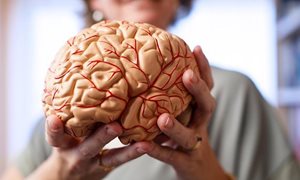
Patients with Parkinson's disease have fewer complications when they are treated by physical therapists, speech therapists, or occupational therapists who are specifically trained in treating Parkinson's disease. A combination of different forms of specialized therapy leads to the greatest reduction in complications. This is shown by a study conducted at the Radboud University Medical Center involving more than 51.000 patients with Parkinson's disease.
One in a hundred people over the age of 55 will develop Parkinson's disease. Although drugs reduce symptoms of the disease, they cannot prevent certain complications. Examples include a broken bone due to a fall or pneumonia resulting from swallowing problems. Therefore, these patients also receive allied health therapy, such as physical therapy, speech therapy and occupational therapy. PhD candidate Amir Talebi and senior author Sirwan Darweesh of Radboudumc’s Neurology Department investigated whether it makes a difference if this therapy is provided by allied healthcare professionals who are specifically trained in care for Parkinson's disease or by regular therapists.
Fewer complications
The researchers used data from all people with Parkinson's disease in the Netherlands, more than 51,000, over a period of nine years. The specialized allied health therapists were trained by the ParkinsonNet organization. For example, physical therapists obtained expertise in providing fall prevention training to people with Parkinson's disease. The study shows that patients receiving specialized treatment by ParkinsonNet physical therapists have twenty-five percent fewer bone fractures than patients receiving regular treatment. Speech therapy by specifically trained therapists reduced pneumonia by thirty percent, while specialized occupational therapy reduced the incidence of complications by approximately ten percent. Darweesh: ‘There was already some evidence that specialized physical therapy had beneficial effects, but this had never been confirmed in such a large group. For speech therapy and occupational therapy, this study breaks completely new ground by demonstrating a protective effect on Parkinson’s complications.'
Greater than the sum of its parts
The study also shows that different forms of specialized allied health therapy reinforce each other. For example, patients with Parkinson's disease who receive both physical and occupational therapy from specifically trained therapists have far fewer complications than patients who receive specialist occupational therapy but regular physical therapy. 'For the first time, we are able to show a team effect,' Darweesh says. 'The combination of the different forms of specialized allied health therapy is greater than the sum of its parts. We therefore call on allied healthcare professionals from different disciplines: work together! People with Parkinson's disease really benefit from a jointly developed treatment plan.'
About the publication
This study was published in Movement Disorders: Specialized versus Generic Allied Health Therapy and the Risk of Parkinson's Disease Complications. A.H. Talebi, J.H.L. Ypinga, N.M. De Vries, J. Nonnekes, M. Munneke, B.R. Bloem, T. Heskes, Y.B. Shlomo, S.K.L. Darweesh. DOI: doi.org/10.1002/mds.29274.
ParkinsonNet as established part of healthcare
The Dutch healthcare sector also endorses the added value of the ParkinsonNet approach. From January 1st, 2023, part of the organization will be funded through the ‘ADZ scheme’. ADZ is a general services healthcare scheme developed by the Ministry of Health, Welfare and Sport, Zorginstituut Nederland, Nederlandse Zorgautoriteit, and Zorgverzekeraars Nederland. This recognizes ParkinsonNet as an established part of healthcare rather than a project. It is the first healthcare (network) organization to receive this funding.
-
Want to know more about these subjects? Click on the buttons below for more news.
More information
Related news items

Dogma broken: sex differences in XLMTM mapped out Women also experience muscle symptoms due to genetic disorder X-linked MTM
6 October 2022For a long time, healthcare professionals thought that only men could suffer from XLMTM, a serious muscle disease that is inherited via the X chromosome. It now appears that women with this genetic defect are also prone to this disease.
go to page





